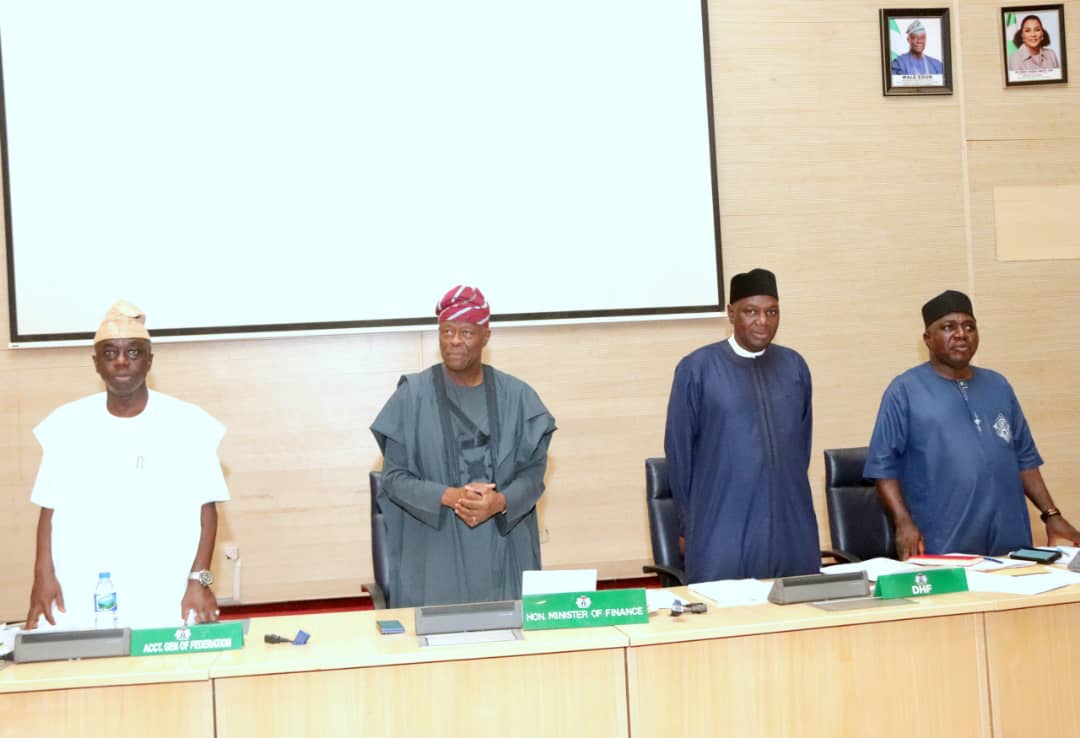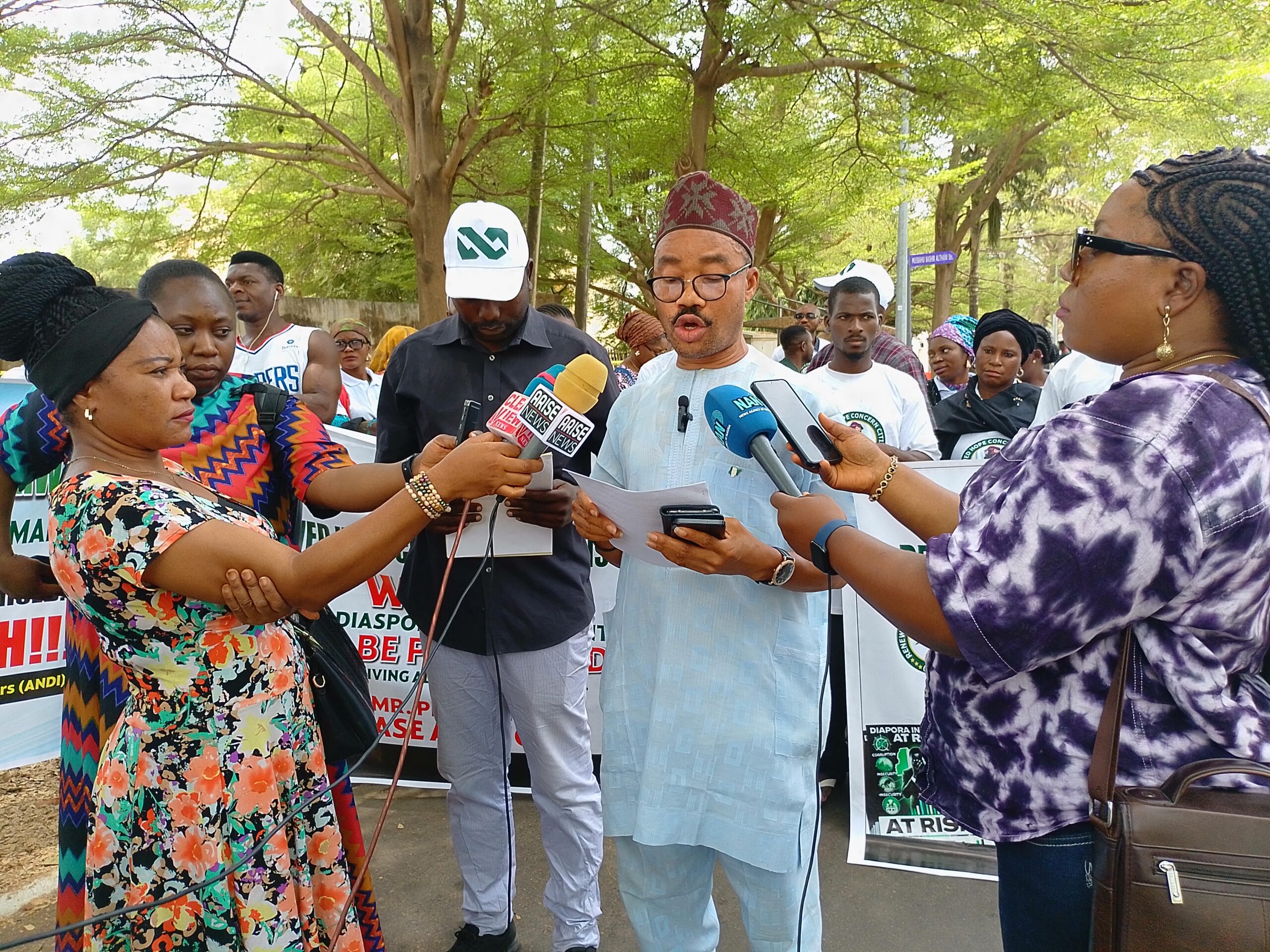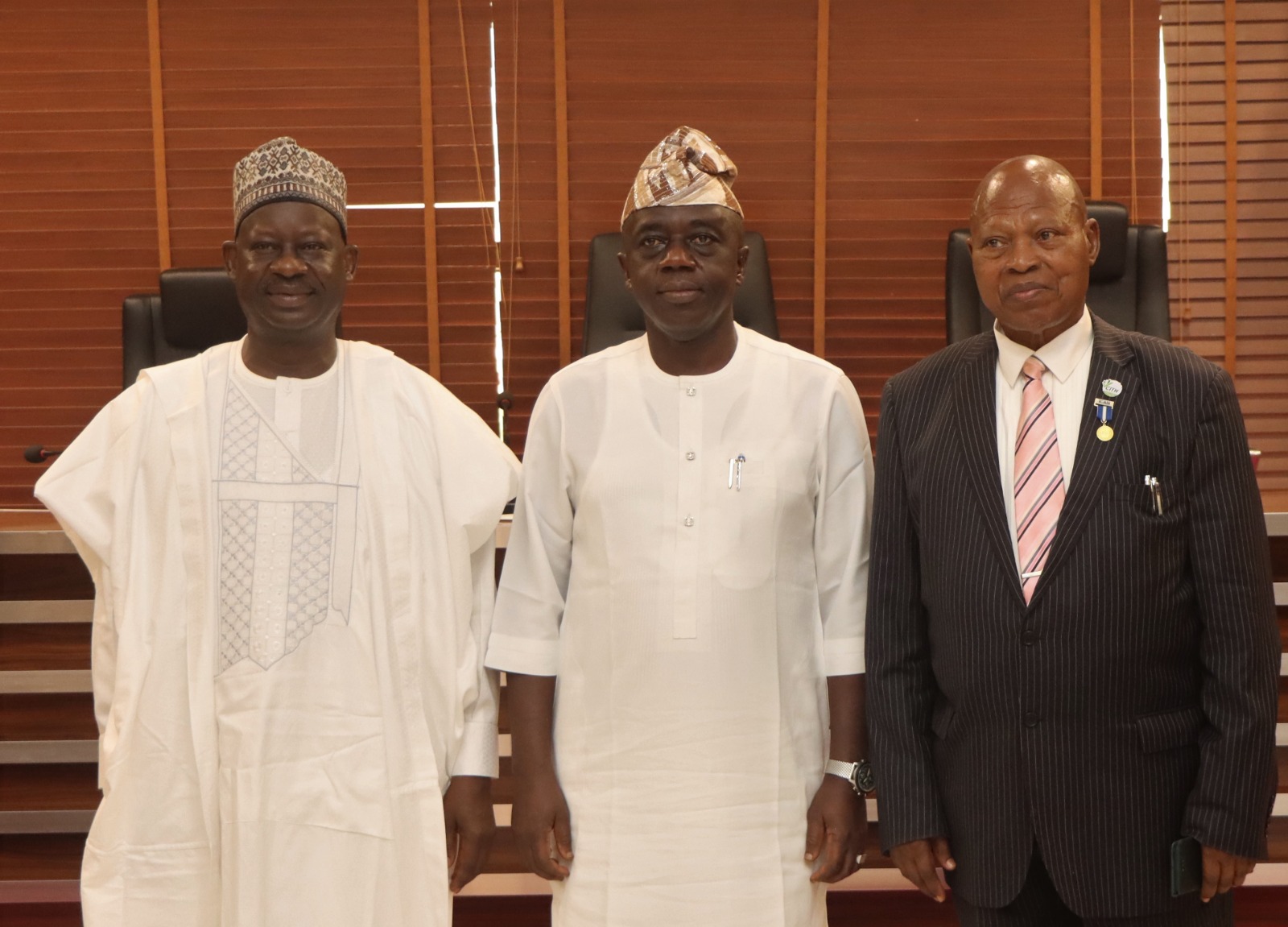Economy
Revenue: Deploy technology to tax every e-commerce transactions, Buhari tells FIRS

The Federal Inland Revenue Service (FIRS) has been told to deploy the necessary technology to tax every digital transactions within the territory of Nigeria in order to massively raise the nation’s revenue.

President Muhammadu Buhari who was represented by the Secretary to the Government of the Federation, Boss Mustapha stated this at the17th General Assembly and 10th Anniversary of the West African Administrations Forum (WATAF), in Abuja.

He said all the needed support has been given to the FIRS to carry out their activities.
The SGF said the FIRS must put in place effective collection measures to effectively generate revenue, without which the agency may not do much, even if there were legislation and sound out policies.
“Digital transactions must be taxed digitally and the goal of our efforts must be to achieve seamless digital collection and remittance of tax revenue that accrues from the digital economy.
According to him, the growing advent of internet should be seen as an advantage which should also be obvious to FIRS as a development in e-commerce.
“Many platforms that started as social media platforms have transited into big businesses generating significant income as it has since become commonplace for entities to consummate business relations remotely, without a physical presence in the countries where goods and services are exchanged.
“Suffice it to say that while this presents great economic and business opportunities, on the one hand, it also presents a challenge as governments must find our way round what is still very much an emerging area of tax administration.”
Meanwhile, the Minister of Finance, Budget and National Planning, Hajia Zainab Ahmed revealed that Nigeria was yet to sign the proposal by the Organisation for Economic Co-operation and Development (OECD) on how to address the global challenge of e-commerce taxation, because it was not equitable.
She however, said, the country has been participating in the global discourse in tax matters with regards to tax rights.
“In this regard, we have continued to contribute our quota in different fora, most importantly at the OECD/G20 Inclusive Framework on Base Erosion and Profit Shifting, otherwise known as the Inclusive Framework (IF).
“Let me highlight that the basis of our involvement in that process was the understanding that a coordinated, universal solution to the tax challenges of the digitalised economy was necessary and that the solution would be fair and acceptable for all members.
“We had hoped that all jurisdictions would be participating in the project on equal footing and that the agreed solution would benefit all while preserving jurisdictions’ existing taxing rights which are not aimed at digital businesses, and that the project would provide universally acceptable rules, by consensus.

Economy
2025 Revenue: FG, States, LGAs share N1.678 trillion

A total sum of N1.678 trillion, being February 2025 Federation Account Revenue, has been shared to the Federal Government, States and the Local Government Councils.

The revenue was shared at the March 2025 Federation Account Allocation Committee (FAAC) meeting held in Abuja; chaired by the Minister of Finance and Coordinating Minister of the Economy, Wale Edun.

The meeting was attended by the Accountant General of the Federation, Shamseldeen Ogunjimi.
The total distributable revenue of N1.678 trillion comprised distributable statutory revenue of N827.633 billion, distributable Value Added Tax (VAT) revenue of N 609.430 billion, Electronic Money Transfer Levy (EMTL) revenue of N35.171 billion, Solid Minerals revenue of N28.218 billion and Augmentation of N178 billion.
According to a communiqué issued by the Federation Account Allocation Committee (FAAC), total gross revenue of N2.344 trillion was available in the month of February 2025. Total deduction for cost of collection was N89.092 billion while total transfers, interventions, refunds and savings was N577.097 billion.
The communiqué stated that gross statutory revenue of N1.653 trillion was received for the month of February 2025. This was lower than the sum of N1.848 trillion received in the month of January 2025 by N194.664 billion.
Gross revenue of N654.456 billion was available from the Value Added Tax (VAT) in February 2025. This was lower than the N771.886 billion available in the month of January 2025 by N117.430 billion.
The communiqué stated that from the total distributable revenue of N1.678 trillion, the Federal Government received total sum of N569.656 billion and the State Governments received total sum of N562.195 billion.
The Local Government Councils received total sum of N410.559 billion and a total sum of N136.042 billion (13% of mineral revenue) was shared to the benefiting States as derivation revenue.
On the N827.633 billion distributable statutory revenue, the communiqué stated that the Federal Government received N366.262 billion and the State Governments received N185.773 billion.
The Local Government Councils received N143.223 billion and the sum of N132.374 billion (13% of mineral revenue) was shared to the benefiting States as derivation revenue.
From the N609.430 billion distributable Value Added Tax (VAT) revenue, the Federal Government received N91.415 billion, the State Governments received N304.715 billion and the Local Government Councils received N213.301 billion.
A total sum of N5.276 billion was received by the Federal Government from the N35.171 billion Electronic Money Transfer Levy (EMTL). The State Governments received N17.585 billion and the Local Government Councils received N12.310 billion.
From the N28.218 billion Solid Minerals revenue, the Federal Government received N12.933 billion and the State Governments received N6.560 billion.
The Local Government Councils received N5.057 billion and a total sum of N3.668 billion (13% of mineral revenue) was shared to the benefiting States as derivation revenue.
The Augmentation of N178 billion was shared as follows: Federal Government received N93.770 billion, the State Governments received N47.562 billion and the Local Government Councils received N36.668 billion.
In February 2025, Oil and Gas Royalty and Electronic Money Transfer Levy (EMTL), increased significantly while Value Added Tax (VAT), Petroleum Profit Tax (PPT), Companies Income Tax (CIT), Excise Duty, Import Duty and CET Levies recorded decreases.

Economy
Protesters urge president Tinubu to protect Diaspora housing investments along Lagos-Calabar coastal highway

A group under the aegis of Renewed Hope Concern Citizens (RHCC) on Friday staged a peaceful protest, calling for President Bola Tinubu’s intervention in protecting housing investments owned by Nigerians in the diaspora along the Lagos-Calabar coastal highway.

The protesters gathered in front of the United States Embassy in Abuja, carrying banners with inscriptions such as; Minister of Works, Senator Umahi should revert to the original gazetted alignment as promised. Enough is Enough; Association of Nigerian Diaspora Investors (ANDI) has cried enough, please intervene to save their energy to promote, support, and assist the Renewed Hope Administration; Renewed Hope Concern Citizens want Diaspora Investments to be protected and given adequate attention among others

“As committed stakeholders in the nation’s economic progress, we have consistently supported the government’s vision, particularly in revitalizing Nigeria’s infrastructure and energy sector. While we acknowledge the administration’s positive strides, recent developments have raised concerns about the misalignment of energy policies, particularly regarding the 2006 Gazetted alignment.
“We urgently call on the Minister of Works, Senator David Umahi, to restore the 2006 Gazetted alignment to ensure continued growth and stability in Nigeria’s energy sector,” said Hon. Tayo Agbaje, Chairman of RHCC, while addressing journalists.
The group refuted the Minister’s claim that an underground cable warranted the removal of structures in Okun Ajah, Lagos and outlined several reasons why President Tinubu’s intervention is crucial.
According to them, The 2006 Gazetted alignment has long provided a stable and predictable framework, essential for maintaining investor confidence in Nigeria’s energy sector.
“Diaspora investors contribute significantly to job creation, business growth, and the overall economy, making their protection vital to sustaining these contributions.
“The President should investigate the Minister of Works’ claim about the underground cable allegedly interfering with the 2006 Gazetted plan.
“Restoring the alignment will reinforce Nigeria’s commitment to a stable investment climate, boosting foreign investor confidence and attracting much-needed capital for infrastructure development.
“Deviating from established policies creates uncertainty, undermining both current and future foreign investments.
“Maintaining the 2006 Gazetted alignment will signal Nigeria’s dedication to long-term economic stability, further reassuring both local and international investors,” the group stated.
The RHCC reaffirmed its support for the Association of Nigeria in Diaspora Investments (ANDI) in its quest to uphold the 2006 Gazetted alignment plan of the Lagos-Calabar Coastal Highway.
They urged the government to act swiftly to protect diaspora investors, as this will strengthen Nigeria’s investment future and ensure continued economic success under the Renewed Hope Administration.

Economy
Ogunjimi promises to collaborate with ex-Accountants-General in taking treasury house to greater heights

The newly appointed Accountant General
of the Federation, Mr Shamseldeen B. Ogunjimi said he would collaborate and tap from the wealth of experiences of all Former Accountants -General of the Federation to bring the nation treasury to a greater height.

Mr Ogunjimi disclosed this while receiving two Former Accountants-General of the Federation, Dr John Naiyeju and Dr Ibrahim Dankwambo in his office in Abuja.

Speaking earlier, Senator Ibrahim Dankwambo suggested the upgrading of the Treasury Academy, Orozo owned by the Office of the Accountant-General of the Federation (OAGF) to a Degree (University) awarding Institute.
Also, Dr. John K. Naiyeju charged the new Accountant-General to carry along everyone and advised him to make staff welfare his priority.
In a related development, the Accountant-General of the Federation expressed his willingness to work with all professional organisation that will bring positive development to the nation, especially, his professional and Academy colleagues of the doctorate class.
Mr Ogunjimi called on his classmates to come up with ideas and suggestions that will enhance the management of the nation’s treasury that will positively affect the economy development.
In his remarks, the Chairman Forum of Doctorate Students, Ibrahim Aliyu said that they were in Treasury House to congratulate one of their own and assured him of their support towards his successful tenure.

-

 Security3 days ago
Security3 days agoNew Commissioner of Police in Niger, Elleman sends strong warning to criminals
-

 Foreign1 week ago
Foreign1 week agoHouthis declare Ben-Gurion Airport ‘no longer safe’ after renewed Gaza fighting
-

 News3 days ago
News3 days agoKogi Governor, Ahmed Usman Ododo salutes Tinubu at 74
-

 News2 days ago
News2 days agoAbia: LG Chairman, Iheke accused of using soldiers to detain IRS agent, claims Governor Otti’s support
-

 News3 days ago
News3 days agoPlateau LP stakeholders endorses Barr Gyang Zi’s defection to APC
-

 Sports1 week ago
Sports1 week ago2026 World Cup Race: Ekong says Eagles feel great to be back in contention
-

 News3 days ago
News3 days agoAkpabio pays historic visit to office of SA to President on Senate Matters
-

 News10 hours ago
News10 hours agoKogi government bans rallies ahead of Natasha’s homecoming slated for Tuesday





















